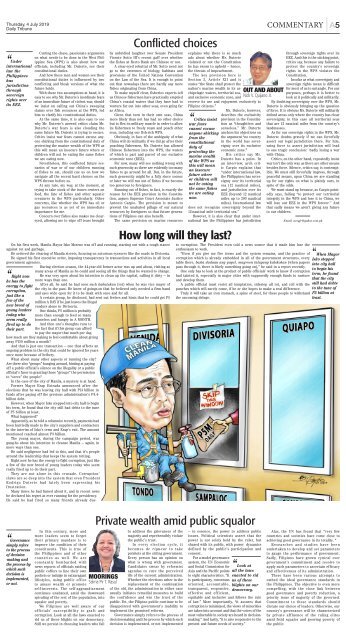04 JULY 2019
You also want an ePaper? Increase the reach of your titles
YUMPU automatically turns print PDFs into web optimized ePapers that Google loves.
Thursday, 4 July <strong>2019</strong><br />
Daily Tribune<br />
“Under<br />
international<br />
law the<br />
Philippines<br />
has<br />
jurisdiction<br />
through<br />
sovereign<br />
rights over<br />
its EEZ.<br />
Cutting the chase, passionate arguments<br />
on what needs to be done in the West Philippine<br />
Sea (WPS) is also about how our<br />
officials, including Mr. Duterte, see their<br />
constitutional duties.<br />
And how these men and women see their<br />
constitutional duties is influenced by two<br />
conflicting and bleak versions of what the<br />
future holds.<br />
With these two assumptions at hand, it is<br />
easy to see why Mr. Duterte’s inordinate fears<br />
of an immediate future of violent war, should<br />
we insist on calling out China’s sweeping<br />
claims over fish resources at the WPS, led<br />
him to clarify his constitutional duties.<br />
At the same time, it is also easy to see<br />
why Mr. Duterte’s avowed critics claim Mr.<br />
Duterte’s war fears is also clouding the<br />
same future Mr. Duterte is trying to secure.<br />
Critics insist war fears cannot excuse anyone<br />
shirking from the constitutional duty of<br />
protecting the marine wealth of the WPS as<br />
this will mean an insecure future where or<br />
children will not be eating the same fishes<br />
we are eating now.<br />
Nevertheless, this conflicted future scenarios<br />
of war or of our children running<br />
of fishes to eat, should cue us on how we<br />
navigate all the recent hard choices on the<br />
WPS thrown before us.<br />
At any rate, my way, at the moment, at<br />
trying to take stock of the issues centers on<br />
food, the fate of fishes and other aquatic<br />
creatures in the WPS particularly. Other<br />
concerns, like whether the WPS has oil or<br />
gas resources is as yet of no immediate<br />
importance for me.<br />
Concern over fishes also makes me cleareyed,<br />
allowing me to wipe off tears brought<br />
Conflicted choices<br />
by unbridled laughter over Senate President<br />
Vicente Sotto III’s recent gaff over whether<br />
the fishes at Recto Bank are Chinese or not.<br />
A clear-eyed rebuttal of Mr. Sotto need not<br />
go to the extremes of biology, habitats and<br />
provisions of the United Nations Convention<br />
on the Law of the Sea. It is enough to point<br />
out that nowadays there are hardly any more<br />
fishes originating from China.<br />
To make myself clear, fisheries experts tell<br />
us Chinese fishermen have practically emptied<br />
China’s coastal waters that they have had to<br />
venture far out into other seas, even going far<br />
as Africa.<br />
Given that turn in their own seas, China<br />
more likely than not has had no other choice<br />
but to flex its military muscle in order to allow<br />
its fishermen to freely roam and poach other<br />
seas, including our fish-rich WPS.<br />
Obviously, in face of the ambiguity of what<br />
China will do militarily if we did go after their<br />
poaching fishermen, Mr. Duterte has allowed<br />
Chinese fishermen into the WPS, the waters<br />
of which is part and parcel of our exclusive<br />
economic zone (EEZ).<br />
For now, many will see nothing wrong with<br />
such generosity as there are evidently too many<br />
fishes to go around for all. But, in the future,<br />
such generosity might be a folly since sooner<br />
or later we will run out of fishes if we become<br />
too generous to foreigners.<br />
Running out of fishes, in fact, is exactly the<br />
reason for the EEZ provision in the Constitution,<br />
argues Supreme Court Associate Justice<br />
Antonio Carpio. The provision is meant to<br />
prevent the unabated pillage of our natural<br />
resources by foreigners so that future generations<br />
of Filipinos can also benefit.<br />
The same provision on marine resources<br />
On his first week, Manila Mayor Isko Moreno was off and running, starting out with a tough stance<br />
against rot and garbage.<br />
He ordered the clearing of Manila streets, focusing on notorious eyesores like the roads in Divisoria.<br />
He signed his first executive order, imposing transparency in transactions and activities in all local<br />
government agencies.<br />
During election season, the 44-year-old former actor was up and about, visiting as<br />
“Right now<br />
he has the<br />
energy to fight<br />
corruption,<br />
just like a<br />
few of the<br />
new breed of<br />
young leaders<br />
today who<br />
seem really<br />
fired up to do<br />
their part.<br />
many areas of Manila as he could and seeing all the things that he wanted to change.<br />
He was very open about his intention to clean up the capital, calling it dirty — in<br />
more ways than one.<br />
After all, he said he had seen such kabulukan (rot) when he was vice mayor of<br />
the city in the past. He knew of goings-on that he believed only needed a firm hand<br />
and eyes wide open for it to be dealt with once and for all.<br />
A certain group, he disclosed, had sent out feelers and hints that he could get P5<br />
million A DAY if he just leaves the illegal<br />
vendors alone in Divisoria.<br />
One thinks, P5 million is probably<br />
more than enough to feed so many<br />
homeless and hungry in A MONTH.<br />
And then one’s thoughts runs to<br />
the fact that if this group can afford<br />
to pay the mayor that much per day,<br />
how much are they making to feel comfortable about giving<br />
away P150 million a month?<br />
And that is just one transaction — one that affects an<br />
ongoing problem in the city that could be ignored for years<br />
once more because of bribery.<br />
What about many other aspects or running the city?<br />
Are there also “groups” hanging around, hinting at paying<br />
off a public official’s silence on the illegality or a public<br />
official’s favor in granting those “groups” the permission<br />
to “serve” the people?<br />
In the case of the city of Manila, a mystery is at hand.<br />
Former Mayor Erap Estrada announced after the<br />
elections that he was leaving city hall with P14 billion in<br />
funds after paying off the previous administration’s P4.4-<br />
billion debt.<br />
However, when Mayor Isko stepped into city hall to begin<br />
his term, he found that the city still had debts to the tune<br />
of P5 billion at least.<br />
What happened?<br />
Apparently, as he told a columnist recently, payments had<br />
been hurriedly made to the city’s suppliers and contractors<br />
in the interim of Isko’s term and Erap’s exit. The amount<br />
mentioned reached almost P3 billion.<br />
The young mayor, during the campaign period, was<br />
gung-ho about his intention to cleanse Manila — again, in<br />
more ways than one.<br />
He said negligence had led to this, and that it’s people<br />
around the leadership that keeps the system rotting.<br />
Right now he has the energy to fight corruption, just like<br />
a few of the new breed of young leaders today who seem<br />
really fired up to do their part.<br />
They are not alone in this crusade. Corruption’<br />
claws are so deep into the system that even President<br />
Rodrigo Duterte had lately been expressing his<br />
frustration.<br />
Many times he had fumed about it, and in recent news<br />
he declared his regret at ever running for the presidency.<br />
He said he had fired so many friends already due<br />
explains why there is so much<br />
ado about whether Mr. Duterte<br />
violated or not the Constitution<br />
he has sworn to uphold — hence,<br />
the threats of impeachment.<br />
The key provision here is<br />
Section 2, Article XII and it<br />
states “the State shall protect the<br />
nation’s marine wealth in its archipelagic<br />
waters, territorial sea,<br />
and exclusive economic zone, and<br />
reserve its use and enjoyment exclusively to<br />
Filipino citizens.”<br />
Mr. Duterte, however,<br />
“Critics insist<br />
war fears<br />
cannot excuse<br />
anyone shirking<br />
from the<br />
constitutional<br />
duty of<br />
protecting the<br />
marine wealth<br />
of the WPS as<br />
this will mean<br />
an insecure<br />
future where<br />
or children will<br />
not be eating<br />
the same fishes<br />
we are eating<br />
now.<br />
describes the exclusivity<br />
provision in the Constitution<br />
as “thoughtless and<br />
senseless.’’ Mr. Duterte<br />
anchors his objections on<br />
the argument “no country<br />
in the world has sovereignty<br />
over its exclusive<br />
economic zone.”<br />
His critics say Mr.<br />
Duterte has a point. In<br />
an interview, arch critic<br />
Carpio explains that<br />
“under international law,<br />
the Philippines has sovereignty<br />
over its territorial<br />
sea (12 nautical miles),<br />
and jurisdiction over its<br />
EEZ (beyond 12 nautical<br />
miles up to 200 nautical<br />
miles). International law<br />
does not recognize sovereignty beyond the<br />
12-nautical mile territorial sea.”<br />
However, it is also clear that under international<br />
law the Philippines has jurisdiction<br />
How long will they last?<br />
OUT AND ABOUT<br />
Nick V. Quijano Jr.<br />
COMMENTARY<br />
A5<br />
through sovereign rights over its<br />
EEZ. And this is the sticking point,<br />
critics say, because any failure to<br />
protect the country’s sovereign<br />
rights in the WPS violates the<br />
Constitution.<br />
Insofar as what sovereignty and<br />
sovereign rights mean is difficult<br />
for most of us to untangle. For our<br />
purposes, perhaps it is better to<br />
look at it politically and militarily.<br />
By doubting sovereignty over the WPS, Mr.<br />
Duterte is obviously bringing up the question<br />
of force. It is obvious Mr. Duterte will militarily<br />
defend areas only where the country has clear<br />
sovereignty, in this case all territorial seas<br />
that are 12 nautical miles from the country’s<br />
landmasses.<br />
As for our sovereign rights in the WPS, Mr.<br />
Duterte doubts gravely if we can forcefully<br />
assert our legal jurisdiction there. For him,<br />
using force to assert jurisdiction will lead<br />
to one tragic conclusion: badly losing a war<br />
with China.<br />
Critics, on the other hand, repeatedly insist<br />
war isn’t the only way as there are other means<br />
besides force. Silence, critics say, is contemptible.<br />
We must still forcefully impress, through<br />
peaceful means, upon China we are standing<br />
up for our rights on what is plainly ours, in<br />
spite of the odds.<br />
We must stand up because, as Carpio pointedly<br />
says, failing “to protect our territorial<br />
integrity in the WPS and lose it to China, we<br />
will lose our EEZ in the WPS forever.’’ And<br />
that sadly means we aren’t giving any future<br />
to our children.<br />
Email: nevqjr@yahoo.com.ph<br />
to corruption. The President even told a news source that it made him lose the<br />
enthusiasm to work.<br />
“Even if you give me five terms and the system remains, and the practice of<br />
corruption which is already embedded in all of the government structures, every<br />
table there, basta dadaan ang papel, mayroon talagang kalokohan (when papers<br />
pass through it, there is likely something going on),” he said in a report recently.<br />
One only has to look at the product of public officials’ work to know if corruption<br />
had tainted it, especially in major cities with supposedly enough funds to nurture<br />
and develop them.<br />
A public official must resist all temptation, sidestep all rot, and roll with the<br />
punches which will surely come, if he or she hopes to make a real difference.<br />
Truly it will take an iron stomach, a spine of steel, for these people to withstand<br />
the oncoming deluge.<br />
“When Mayor<br />
Isko stepped<br />
into city hall<br />
to begin his<br />
term, he found<br />
that the city<br />
still had debts<br />
to the tune of<br />
P5 billion at<br />
least.<br />
“Governance<br />
simply refers<br />
to the process<br />
of decision<br />
-making and<br />
the process by<br />
which such<br />
decision is<br />
implemented,<br />
or not.<br />
In this century, more and<br />
more leaders seem to forget<br />
their primary mandate is to<br />
improve the condition of their<br />
constituents. This is true of<br />
the Philippines and of other<br />
countries as well. We are<br />
constantly bombarded with<br />
news reports of officials raiding<br />
public coffers to line their own<br />
pockets or indulge in extravagant<br />
lifestyles, using public office<br />
to amass wealth or promote<br />
self-interests. The self-aggrandizement<br />
continues unabated, amid the downward<br />
spiraling of the rest of the population, into<br />
squalor and poverty.<br />
We Filipinos are well aware of our<br />
officials’ susceptibility to graft and<br />
corruption. Look at all the laws enacted to<br />
rid us of these blights on our democracy.<br />
Still we persist in choosing leaders who fail<br />
Private wealth amid public squalor<br />
MOORINGS<br />
Salma Pir T. Rasul<br />
to address the grievances of the<br />
majority and reprehensibly violate<br />
the public’s trust.<br />
In every election cycle, it<br />
becomes de rigueur to take<br />
potshots at the sitting government.<br />
Every person has an opinion on<br />
what is wrong with government.<br />
Candidates swear by reformist<br />
agendas to cure the perceived<br />
ills of the current administration.<br />
Whether the elections usher in the<br />
replacement or the continuation<br />
of the old, the administration in either case<br />
usually initiates remedial measures to build<br />
the confidence and win the trust of the<br />
public. Yet, the Filipino public continue to be<br />
disappointed with government’s inability to<br />
implement the promised reforms.<br />
Governance simply refers to the process of<br />
decision-making and the process by which such<br />
decision is implemented, or not implemented<br />
— in essence, the power to address public<br />
issues. Political scientists assert that the<br />
power is not solely held by the ruler, but<br />
shared with its public, with power dynamics<br />
defined by the public’s participation and<br />
consent.<br />
For a model governance<br />
system, the UN Economic<br />
and Social Commission for<br />
Asia and the Pacific points<br />
to eight characteristics. “It<br />
is participatory, consensus<br />
oriented, accountable,<br />
transparent, responsive,<br />
effective and efficient,<br />
“Look at<br />
all the laws<br />
enacted to rid<br />
us of these<br />
blights on our<br />
democracy.<br />
equitable and inclusive and follows the rule<br />
of law.” More importantly, “it assures that<br />
corruption is minimized, the views of minorities<br />
are taken into account and that the voices of the<br />
most vulnerable in society are heard in decisionmaking.”<br />
And lastly, “it is also responsive to the<br />
present and future needs of society.”<br />
Alas, the UN has found that “very few<br />
countries and societies have come close to<br />
achieving good governance in its totality. “<br />
Researches and studies have been<br />
undertaken to develop and set parameters<br />
to gauge the performance of government.<br />
Sadly, Filipinos have grown cynical over<br />
government’s commitment and resolve to<br />
apply such parameters to ascertain efficacy<br />
and effectiveness of its administration.<br />
There have been various attempts to<br />
embed the ideal governance standards in<br />
the Philippines. The objective is even more<br />
compelling, with the close link between<br />
good governance and poverty reduction, a<br />
priority issue of majority of the governed.<br />
Commitment to these standards should<br />
dictate our choice of leaders. Otherwise, our<br />
country’s governance will be characterized<br />
by private affluence of the ruling elites<br />
amid fetid squalor and growing poverty of<br />
the public.


















